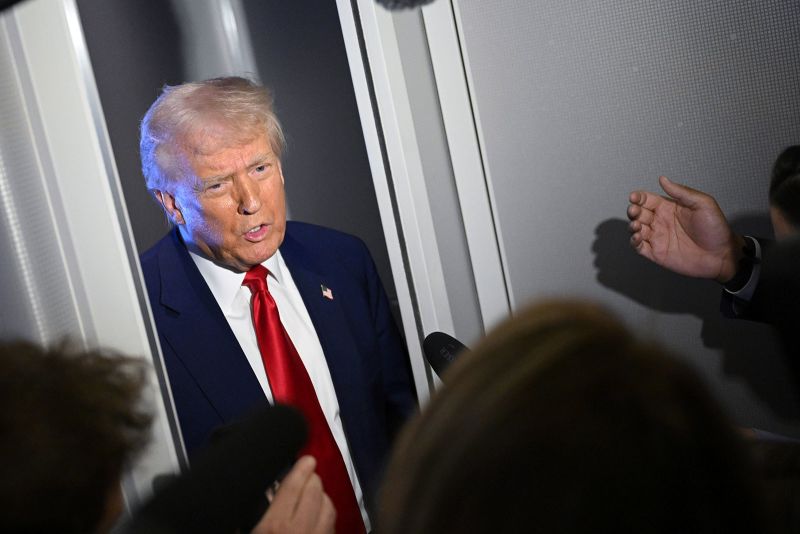Editor’s Note: Join Fareed Zakaria on Sunday, April 6 at 8pmET/PT as he examines the long history of the conservative movement’s struggle to roll back government in “The War on Government: A Fareed Zakaria Special”.
When Donald Trump announced that he was creating the Department of Government Efficiency, I welcomed the initiative. Streamlining the federal government by having outsiders take a look was an excellent idea. And Elon Musk’s stated objective, to cut the budget by $2 trillion, while ambitious, would be a useful yardstick.
But DOGE began its work not by taking on the most logical targets if you were really looking for waste, fraud and abuse – places like Medicare and the Defense Department with their gigantic budgets. No, its first major target was a tiny agency most Americans had probably never heard of. The US Agency for International Development, whose total budget, around $40 billion, was less than 1% of federal spending. DOGE went after it with a brutality and glee that was stunning. Musk called it a “criminal organization.” Government officials who had spent years in foreign countries providing assistance to the poor were summarily fired and asked to return home. Medical and nutrition programs were cut off, with the likely consequence that, by some calculations, millions would get sick or starve.
What could explain this cruelty directed at people and programs that in budgetary terms were insignificant? DOGE seemed to understand the central challenge the right faces in its war on government. The real money is in the large programs that the public supports. So DOGE began its war by choosing a broadly unpopular item of government spending – on foreigners.
Musk and Trump delighted in listing all the fraud that they found, even though none of the projects they listed have shown any evidence of large-scale corruption. They were simply programs they knew many Americans would not want to fund – especially when they were mischaracterized.
DOGE did take on Social Security, but in a rather strange way. It claimed to find millions of dead people on its rolls. The implication was that these people were still getting payments. Actually,all they appear to have found were old personnel files in which dead people’s names had not been deleted – much like your rolodex or contact folder probably still has the names of people who are deceased. Almost none appear to be getting benefits. But again, it was a revealing strategy. Rather than talk seriously about changing Social Security – by means testing benefits or raising the retirement age – DOGE was promising that it could save billions by just cleaning up the personnel files.
Of course it’s possible to find savings in Washington. Former Vice President Al Gore’s Reinventing Government Commission saved the federal government around $140 billion dollars. But it worked in a manner that was almost the opposite of DOGE. It partnered with the agencies to identify redundancies, worked with Congress to change laws, and used a scalpel to trim fat. DOGE, on the other hand, has been doing mass firings without much consultation, so much so that its large-scale IRS firings could result in significantly lower tax revenues collected – which would raise the deficit.
DOGE has also been firing masses of workers. But the federal bureaucracy is small compared with other rich countries and is about the same size as it was 50 years ago.
It’s worth remembering where the money is. Social Security, Medicare, Medicaid, and other mandatory spending like veterans’ benefits – along with defense spending and interest payments – make up around 85% of the budget. Much of this is efficient check writing, which doesn’t require much bureaucracy. The Department of Defense could be massively reformed, as the Trump administration has begun to do a little bit. But why does it have four air forces – the Army’s, Navy’s, Marines’, and Air Force itself?
If DOGE approached the problem as one does in the private sector, it would recognize there are two components to any deficit – how much you spend and how much you take in, in this case through taxes. America’s bloated national debt has a great deal to do with a series of tax cuts that began in the Reagan administration. By one estimate from a progressive think tank, the Bush and Trump tax cuts alone have added $10 trillion to the debt and account for 57% of the increase in America’s debt-to-GDP ratio since 2001. Bear in mind, that compared to other rich countries, the United States still has close to the lowest tax revenues as a percent of its GDP.
In that context, the simplest way for DOGE to achieve maximum success would be to recommend that the Trump tax cuts be allowed to lapse as they will under law, which would then reduce the debt by about $4.5 trillion over the next 10 years, vastly more than any plan the GOP seems willing to go through with to cut spending. That would take America back to the tax rates under former President Barack Obama, when the stock market more than doubled, and America grew faster than almost every European country. And it would put the US on a much more stable debt trajectory.
But don’t hold your breath on that happening. Far more likely, DOGE will announce some new stunning finding, something like software duplication in the Environmental Protection Agency, which might save the federal government $100 million – or .001% of the 2025 budget.


